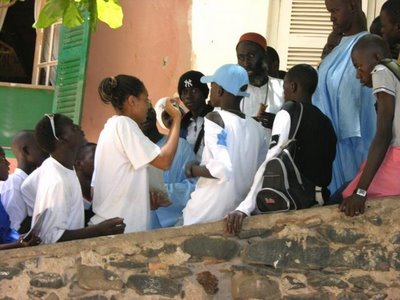
This intellectual paralysis is visible across most of Africa. Countries that have invested in strategically in key sectors such as energy, transport, telecommunicatio, education and security have stood out more competitve than their sisters stuck in the industrial revolution structural formations. South Africa, Tunisia today stand out of the crowd as Information states while the rest are the bloated governments of the past century. ICT like any other engine of development operates in an intergrated way. In Uganda today, much as government have made good of the policy incentives to develop ICT through taxation incentives, it has not done the same on energy which has hit the heart of ICT growth with constant power black-outs. That even with the formation of the ICT Ministry,politically its hard to tell whether the government has the vision to re-engineer business, restructure government departments and streamline operations in order to be in the lead of revolutionarizing economic production.
ICT today is an epicenter of development because it helps economies run competitively in this era of the information boom.Malysia; Taiwan, Singapore and Hong Kong have upgraded their economies because the right political decisions have been made by the top leadership. These Governments that have digitalized Information today have made a shift from industrial revolution structural formations because they see reason for being people-centered governments. They appreciate the good in building accountable and efficient national institutions that must serve country. In Africa we are stunted in the industrial revolution structures manifested by big cabinets, big armies, a Nambole parliament, a battalion of RDCs, LCs, DISOs, DPCs, Presidential Advisors, Mobilizers and all forms of Public Administration bloated ness. This characteristics render human capital redundant and non productive as predation on the state is perpetuated politically albeit ignorantly or deliberately.
Governments, all over the world are the biggest custodian of Public Information and must be the biggest employer of ICT so that it can complement and serve the Business Community and Citizens more efficiently. The Telecom Industry in Uganda is doing fairly well but needs infrastructural and policy incentives such as a stable energy supply and the right policy prescription to reduce cost of administration. The establishment of the Ministry of ICT must reflect a shift in policy and a clear vision of where the top leadership wants the country to go. The momentum for policy formulation and implementation must reflect a committed leadership too. The Private Sector in Partnership needs a government willing to re-engineer business processes. For government to fully appreciate the positive impact of ICT It has to develop a vision and the right policy thrust. It is from the Political vision that government will see the need to restructure its departments and reduce inter-agency duplication (URA, UIA, ULC etc) of roles and thus reduction of wastage and paralysis in decision making. It means automation of business processes and therefore a government going On-Line. Restructuring of government means elimination of whole or merging of redundant departments with potential to demobilize personnel. This is political and has cultural and political back-lashes but the good must always out-weigh the bad. The fear to take bold decisions especially when fully armed with knowledge of models that have worked should be discouraged.
The right policy prescription means addressing those strategic sectors that will help expand an economy for all. It means strategically addressing the energy demand issues in the immediate, short and long term. I means exploring renewable energy sources, it means revamping the education system to build a core human capital to meet the new global, regional and national market demands, it means forming strategic public-private partnerships, it means looking into the future and extrapolating our strategic national alignment with the emerging regional and global alliances. Finally it means revolutionarizing our thinking and attaching value to time. It is a shared vision that will bring cohesion on our development needs, priorities and then embark on building a future Uganda for our children.
Shaka Robert
Network Engineer/Biochemist





 It appears that Heritage Oil and Executive Outcomes are owned by the same network of mercenary corporations that includes Branch Energy (reputedly a Heritage Oil share holder), ex-South African troops, and Canadian mineral extraction firms. Heritage Oil has operations in Angola, Congo-Brazaville, DRC, Oman, and Uganda. Executive Outcomes was involved in Sierra Leone, Angola, Kenya, Uganda, Sudan, Malawi, Mozambique, South Africa and Canada. Measures to curb the commercial fuel of the conflict have been suggested by the UN panel's report, which recommends reducing development aid flows to offending countries; tighter controls on the trade in conflict goods; travel bans on individuals; freezing of personal assets; and blacklisting of selected companies and individuals from dealings with international financial institutions. Mercenaries, now simply called "private military contractors", some of whom are subsidiaries of Fortune 500 companies in the USA, are violating the
It appears that Heritage Oil and Executive Outcomes are owned by the same network of mercenary corporations that includes Branch Energy (reputedly a Heritage Oil share holder), ex-South African troops, and Canadian mineral extraction firms. Heritage Oil has operations in Angola, Congo-Brazaville, DRC, Oman, and Uganda. Executive Outcomes was involved in Sierra Leone, Angola, Kenya, Uganda, Sudan, Malawi, Mozambique, South Africa and Canada. Measures to curb the commercial fuel of the conflict have been suggested by the UN panel's report, which recommends reducing development aid flows to offending countries; tighter controls on the trade in conflict goods; travel bans on individuals; freezing of personal assets; and blacklisting of selected companies and individuals from dealings with international financial institutions. Mercenaries, now simply called "private military contractors", some of whom are subsidiaries of Fortune 500 companies in the USA, are violating the 








 This population explosion can be explained from an ecological perspective but equally presents the most hidden strategic key to opening our door to the geo-global political system as agents of development rather than beings waiting for humanitarian interventions in perpetuity. The natural instinct that dictates genetic self preservation has induced Africans and Ugandans in rural communities into this wave of mass-reproduction. No population planning program has been able to decelerate the current reproductive rates among the illiterates in Uganda. No amount of HIV/AIDS has forced the very drenched of the earth from their natural responsibility of self-preservation. No amount of famine, draught, or violence has stopped the most vulnerable from re-producing and all this points to that survivorship phenomenon where many Africans and Ugandans find themselv
This population explosion can be explained from an ecological perspective but equally presents the most hidden strategic key to opening our door to the geo-global political system as agents of development rather than beings waiting for humanitarian interventions in perpetuity. The natural instinct that dictates genetic self preservation has induced Africans and Ugandans in rural communities into this wave of mass-reproduction. No population planning program has been able to decelerate the current reproductive rates among the illiterates in Uganda. No amount of HIV/AIDS has forced the very drenched of the earth from their natural responsibility of self-preservation. No amount of famine, draught, or violence has stopped the most vulnerable from re-producing and all this points to that survivorship phenomenon where many Africans and Ugandans find themselv
 Scientists in Europe now recognize another role of the Alps, like many mountain ranges with glaciers, as a barometer to asses the extent of climatic change and the> impact of global warming. In Uganda today, the Scandinavian nations have a massive environmental program which indeed emphasizes growing trees by the rural folks. Poor Africans will not grow trees because that is not their immediate interest. They do not even care what forests are for because they are illiterate. They also want land to grow food for their growing large families since they can't sell their produce anywhere.The increasing population of the poor and illiterate who form the most important agent of environmental degradation forms the epicenter of my discussion.
Scientists in Europe now recognize another role of the Alps, like many mountain ranges with glaciers, as a barometer to asses the extent of climatic change and the> impact of global warming. In Uganda today, the Scandinavian nations have a massive environmental program which indeed emphasizes growing trees by the rural folks. Poor Africans will not grow trees because that is not their immediate interest. They do not even care what forests are for because they are illiterate. They also want land to grow food for their growing large families since they can't sell their produce anywhere.The increasing population of the poor and illiterate who form the most important agent of environmental degradation forms the epicenter of my discussion. 
 A
A










